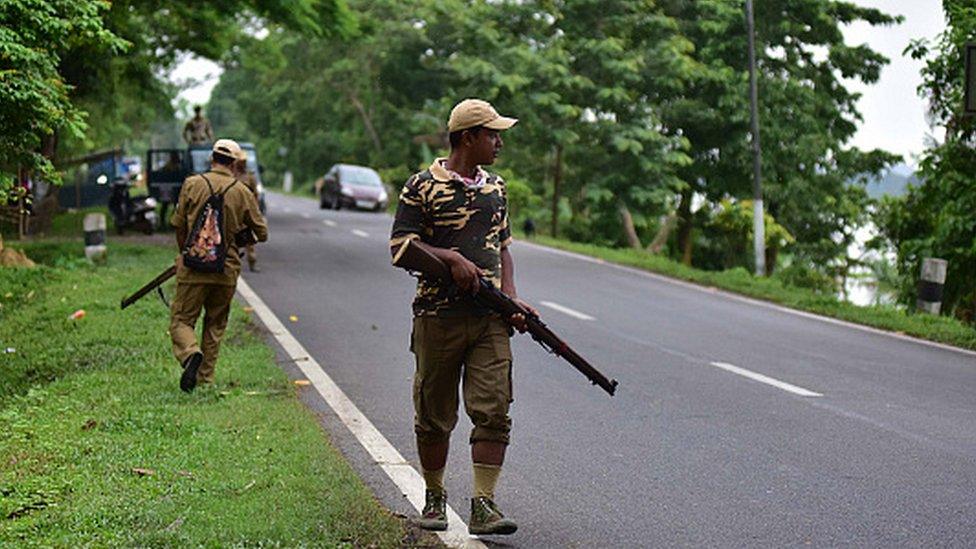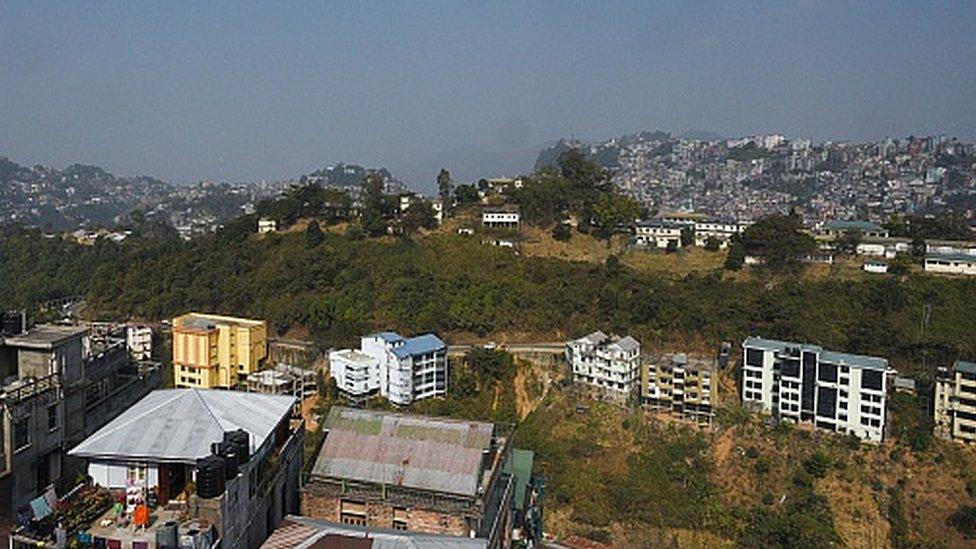Assam-Mizoram clash: Why peace is fragile between two India states
- Published

Assam shares a 164 km-long border with Mizoram
India's north-eastern state of Assam is advising locals against travelling to neighbouring Mizoram in the wake of violent clashes at the border.
Six policemen from Assam died and 80 others, including officials, were injured on Monday when police from the two states fired at each other.
Officials from both sides, including chief ministers, have accused each other of provoking the violence.
Although there has been no fresh violence, tensions continue.
Mizoram has accused Assam of mobilising police along the border, and has asked the federal government to intervene.
Assam has said it has withdrawn its forces, but Mizoram is yet to do so. It also alleged, in its travel advisory, that video footage showed civilians from Mizoram carrying automatic weapons along the border.
The advisory cited "personal safety" as the main reason and asked Assamese people who live in Mizoram to "exercise utmost caution".
The violence follows months of tensions over a long-running border dispute. The federal government has been trying to mediate a truce between the states since 1994.
So, what is the problem?
Mizoram and Assam, along with five other states, are in the north-east region of India, which runs from the snow-clad Himalayas just below Tibet to the plains of Bangladesh, and borders the jungles of Myanmar (Burma) to the east.
Under colonial rule, Lushai Hills, as Mizoram was then known, was part of Assam. The region only gained recognition in 1972 - almost three decades after India's independence - when it became a separate federally administered area. In 1987, it became a fully-fledged state.
Three districts in Assam - Cachar, Hailakandi and Karimganj - share a 164km-long border with three districts of Mizoram.

Mizoram was carved out of Assam in 1972
The forested area is contested at several points, with both Assam and Mizoram accusing each other of encroaching on their land.
The first row broke out in 1994, leading to several rounds of talks that were brokered by the federal government. But sporadic clashes have continued.
Tensions escalated to an unprecedented level in October 2020 when residents of Assam and Mizoram clashed twice in a week. At least eight people were injured as angry residents torched huts and small shops on both sides.
At the heart of the matter was an "eviction drive" carried out by Assam along a contested part of the border - authorities from the state reportedly burned a farmhouse and crops in the area. The Mizoram government responded by deploying troops in areas which Assam claims is part of its territory.
Residents from both states also blocked key highways, bringing all traffic to a halt for almost three weeks until the federal government intervened to defuse tensions.
What happened this time?
Tensions escalated after clashes erupted between police on either side of a contentious border point, Lailapur, according to local reports.
Assam's chief minister, Himanta Biswa Sarma, announced on Twitter that members of the state police were killed by Mizoram forces "while defending the constitutional boundary".
Police in Assam also alleged that "miscreants" from Mizoram pelted them with stones and attacked government officials.
Allow X content?
This article contains content provided by X. We ask for your permission before anything is loaded, as they may be using cookies and other technologies. You may want to read X’s cookie policy, external and privacy policy, external before accepting. To view this content choose ‘accept and continue’.

But authorities in Mizoram denied this.
The state's home minister, Lalchamliana, said, external Mizoram policemen responded "spontaneously by firing back" at Assam police officials after they "forcibly crossed" a post manned by the Central Reserve Police Force (CRPF).
The federal government has deployed the CRPF as a "neutral force" at the disputed border.
Meanwhile, Mr Sarma and Mizoram's chief minister, Zoramthanga, argued on Twitter, external, blaming each other for the violence and seeking the federal government's intervention.
Both chief ministers had attended a meeting chaired by Home Minister Amit Shah in the city of Shillong on Saturday.
On Monday, Mr Shah reportedly spoke to Mr Zoramthanga and Mr Sarma, and urged them to find an "amicable solution".

Living in limbo: Assam's four million unwanted
